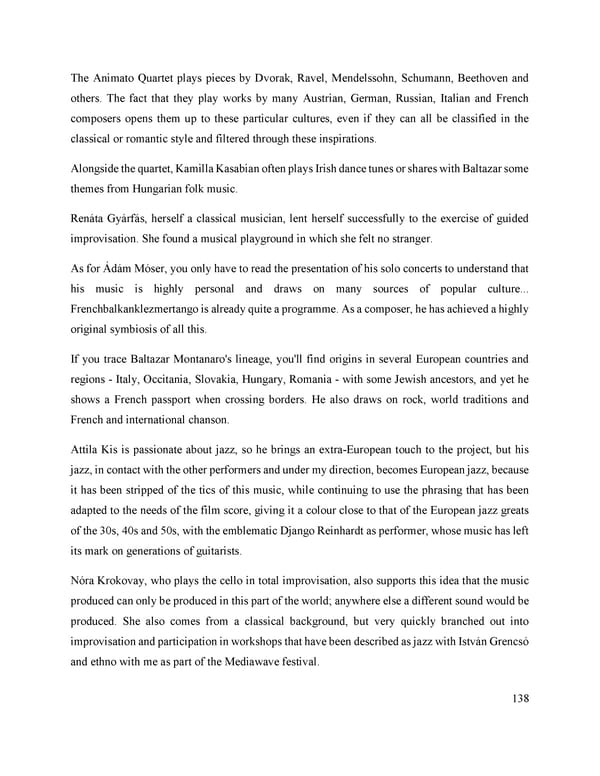The Animato Quartet plays pieces by Dvorak, Ravel, Mendelssohn, Schumann, Beethoven and others. The fact that they play works by many Austrian, German, Russian, Italian and French composers opens them up to these particular cultures, even if they can all be classified in the classical or romantic style and filtered through these inspirations. Alongside the quartet, Kamilla Kasabian often plays Irish dance tunes or shares with Baltazar some themes from Hungarian folk music. Renáta Gyárfás, herself a classical musician, lent herself successfully to the exercise of guided improvisation. She found a musical playground in which she felt no stranger. As for Ádám Móser, you only have to read the presentation of his solo concerts to understand that his music is highly personal and draws on many sources of popular culture... Frenchbalkanklezmertango is already quite a programme. As a composer, he has achieved a highly original symbiosis of all this. If you trace Baltazar Montanaro's lineage, you'll find origins in several European countries and regions - Italy, Occitania, Slovakia, Hungary, Romania - with some Jewish ancestors, and yet he shows a French passport when crossing borders. He also draws on rock, world traditions and French and international chanson. Attila Kis is passionate about jazz, so he brings an extra-European touch to the project, but his jazz, in contact with the other performers and under my direction, becomes European jazz, because it has been stripped of the tics of this music, while continuing to use the phrasing that has been adapted to the needs of the film score, giving it a colour close to that of the European jazz greats of the 30s, 40s and 50s, with the emblematic Django Reinhardt as performer, whose music has left its mark on generations of guitarists. Nóra Krokovay, who plays the cello in total improvisation, also supports this idea that the music produced can only be produced in this part of the world; anywhere else a different sound would be produced. She also comes from a classical background, but very quickly branched out into improvisation and participation in workshops that have been described as jazz with István Grencsó and ethno with me as part of the Mediawave festival. 138
 Lost Analogue: Exploring Film, Music, and Interdisciplinary Methods in Education Page 138 Page 140
Lost Analogue: Exploring Film, Music, and Interdisciplinary Methods in Education Page 138 Page 140